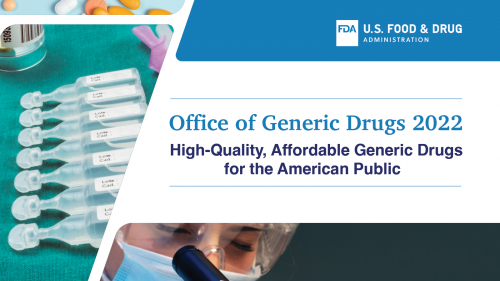Collaboration and Scientific Innovation Stimulated Advancement in the Generic Drug Program in 2022

By: Susan M. Rosencrance, Ph.D., Acting Director, Office of Generic Drugs, Center for Drug Evaluation and Research
Generic drugs account for approximately 91% of prescriptions dispensed but only 18% of total drug costs, making them a vital part of the U.S. health care system. Competition among generic drug makers and with their brand name counterparts has helped make drugs more widely available and generally less expensive, allowing millions of patients to access needed medicines more easily. Generic drugs can also help stabilize the supply of medicines and reduce the risk of drug shortages.
The U.S. Food and Drug Administration’s Office of Generic Drugs (OGD) in the Center for Drug Evaluation and Research, works to evaluate generic drugs, which helps ensure high-quality, affordable drugs are available to the public. In 2022, OGD had a very productive year with work on the reauthorization of Congressional legislation, the approval of hundreds of generic drugs, including complex generics, and on expanding international collaborations. We discuss these actions and others in our recently published OGD 2022 Annual Report.
Generic Drug User Fee Amendments
In 2022, Congress authorized the Generic Drug User Fee Amendments (GDUFA) III, which went into effect on Oct. 1, 2022. GDUFA III enhancements will build on the successes of GDUFA I and GDUFA II, with a focus on reducing the number of assessment cycles to advance earlier generic drug approvals. For more information on the GDUFA III reauthorization, please visit our GDUFA III webpage. In the 10 years since the legislation was first enacted, GDUFA has increased research for generic drugs and has helped strengthen and diversify the pipeline of generic drug applications that the generic drug program assesses and approves.
Generic Drug Approvals and First Generics
In addition to preparing for GDUFA III implementation, the generic drug program approved or tentatively approved 914 abbreviated new drug applications, including 106 first generics, in 2022. Some of these first generic drug examples include:
• The first generic cyclosporine ophthalmic emulsion, 0.05% (referencing Restasis), for treating dry eye.
• The first generics for pemetrexed for injection (14 generics referencing Alimta approved on the same day) for treating non-squamous non-small cell lung cancer and mesothelioma.
• The first generics for bortezomib for injection (eight generics referencing Velcade approved on the same day) for treating multiple myeloma and mantle cell lymphoma.
Science and Research Help Increase Access to Complex Generic Drugs
The FDA worked to advance scientific research in 2022 through the GDUFA Science and Research Program. This program helps ensure that regulatory standards, recommendations, and decisions are based on the most current scientific evidence. Outcomes from GDUFA-funded research can expand the FDA’s understanding of generic drugs, including complex generics, and can help develop advanced methods to characterize product quality and performance. These methods may play a critical role in determining how the FDA evaluates the quality and bioequivalence of complex generic products and can establish the scientific basis for novel and more efficient generic drug development pathways.
For example, the 2022 approval of the first generic cyclosporine ophthalmic emulsion, 0.05% (referencing Restasis) was helped by many years of GDUFA science and research that advanced more efficient approaches to demonstrating bioequivalence for complex generic drugs, including a series of research projects related to cyclosporine ophthalmic emulsion. The GDUFA-supported research addressed challenging product characterization issues, developed analytical measurement and statistical analysis tools, and supported updates to generic product development recommendations in product-specific guidances, which helped with the assessment and approval of this first generic product.
International Collaborations
The FDA’s impact also extended beyond U.S. borders. As a global leader, the FDA is actively engaged in collaboration with regulatory authorities around the world to harmonize standards for the development of safe, effective, high-quality generic medicines. In 2022, for instance, under a new Parallel Scientific Advice pilot program for complex generic products, applicants submitted meeting requests to the FDA and the European Medicines Agency simultaneously to discuss specific questions regarding the development of complex generic products and subsequently received concurrent scientific advice from both agencies. This concurrent feedback can help to deepen the applicant’s understanding of both agencies’ regulatory decisions, optimize the product’s global development, and shorten the time to receive regulatory approval by avoiding unnecessary replication of studies or unnecessary testing methodologies. Additionally, through the Generic Drug Cluster multi-country forum, the FDA and other regulatory agencies collaborated on important regulatory topics. Finally, in December 2022, the first International Council for Harmonisation of Technical Requirements for Pharmaceuticals for Human Use (ICH) generic drug draft guideline titled “M13A Bioequivalence for Immediate-Release Solid Oral Dosage Forms” was released for public consultation. The FDA’s OGD participated and led the international harmonization efforts through collaboration on the ICH M13 Expert Working Group.
OGD 2022 Annual Report
For more information about the FDA’s generic drug program, please view the OGD 2022 Annual Report, which provides a comprehensive look at accomplishments and illustrates how the office is well-positioned to continue its critical work in 2023.

